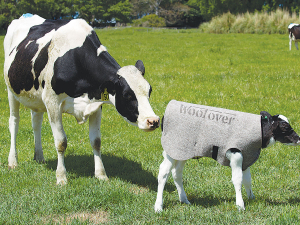Managing director of Woolover Ltd, David Brown, has put a lot of effort into verifying what seems intuitive, that keeping newborn stock's core temperature stable pays dividends by helping them realise their full genetic potential.
The Woolover covers for lambs and calves have been around for a while now, and their worth had been verified in the field and also in trials, here and in North America. The concept is simple: fit a wool cover that costs a few dollars to protect newborn lambs or calves to maximise productivity across the animal's life - easily covering the small cost of the cover. It can also reduce the percentage of fatalities due to harsh weather.
"What we do know is, when the temperature drops to say plus 4 degrees C, we know that two thirds of the calves' food intake is now simply directed to trying to get warm, as opposed to using that food intake into growing," says Brown.
Brown says by covering a newborn from day one, you ensure the animal's core temperature is constant, day and night. He says that even if young stock are kept in a pen or barn, if they are not covered, they will still be cold.
"Our US trial data suggests that over a 60-day period, Woolover covered calves gained a total of 39lb by weaning," says Brown.
The 2017 trial involved 100 bull calves on Busse's Barron Acres farm in Wisconsin, where long, cold nights are common. The results were similar to another trial the company did a year earlier.
The covers are widely used in New Zealand, sold through good merchants like PGG Wrightson and Farmlands.
Warren & Denise MacPherson, Springhills, Southland have been using Woolover Calf covers for the past four years, putting them on their dairy replacements from 2-3 days old. They say calves with Woolover covers on can be introduced to the cold outdoor conditions sooner.
"It is lovely to see the contented thriving calves that look so cuddly in their woolly coats. The calves are very active and playful with growth and weight gains obvious."
Having seen productivity gains from using Woolover covers with their dairy replacement heifers, the MacPhersons are now using them on all calves born to dairy stock that are reared. They say it is much easier to rear thriving calves that are always warm, and that their calves are now stronger, bigger and healthier.


















